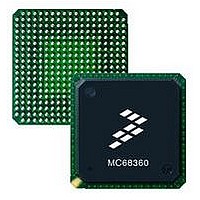MC68EN360CAI25L Freescale Semiconductor, MC68EN360CAI25L Datasheet - Page 709

MC68EN360CAI25L
Manufacturer Part Number
MC68EN360CAI25L
Description
IC MPU QUICC 25MHZ 240-FQFP
Manufacturer
Freescale Semiconductor
Series
MC68000r
Datasheets
1.MC68EN302AG20BT.pdf
(8 pages)
2.MC68EN360VR25L.pdf
(14 pages)
3.MC68EN360VR25L.pdf
(2 pages)
4.MC68EN360CAI25L.pdf
(962 pages)
Specifications of MC68EN360CAI25L
Processor Type
M683xx 32-Bit
Speed
25MHz
Voltage
5V
Mounting Type
Surface Mount
Package / Case
240-FQFP
Core Size
32 Bit
Cpu Speed
25MHz
Embedded Interface Type
SCP, TDM
Digital Ic Case Style
FQFP
No. Of Pins
240
Supply Voltage Range
4.75V To 5.25V
Rohs Compliant
Yes
Family Name
M68xxx
Device Core
ColdFire
Device Core Size
32b
Frequency (max)
25MHz
Instruction Set Architecture
RISC
Supply Voltage 1 (typ)
5V
Operating Supply Voltage (max)
5.25V
Operating Supply Voltage (min)
4.75V
Operating Temp Range
-40C to 85C
Operating Temperature Classification
Industrial
Mounting
Surface Mount
Pin Count
240
Package Type
FQFP
Lead Free Status / RoHS Status
Lead free / RoHS Compliant
Features
-
Lead Free Status / Rohs Status
Compliant
Available stocks
Company
Part Number
Manufacturer
Quantity
Price
Company:
Part Number:
MC68EN360CAI25L
Manufacturer:
APLHA
Quantity:
12 000
Company:
Part Number:
MC68EN360CAI25L
Manufacturer:
Freescale Semiconductor
Quantity:
10 000
Part Number:
MC68EN360CAI25L
Manufacturer:
FREESCALE
Quantity:
20 000
- MC68EN302AG20BT PDF datasheet
- MC68EN360VR25L PDF datasheet #2
- MC68EN360VR25L PDF datasheet #3
- MC68EN360CAI25L PDF datasheet #4
- Current page: 709 of 962
- Download datasheet (4Mb)
SECTION 8
SCAN CHAIN TEST ACCESS PORT
The QUICC provides a dedicated user-accessible test access port (TAP) that is JTAG com-
patible.
The QUICC TAP contains one additional signal not available with the MC68340 TAP—the
test reset (TRST) signal. This signal provides an asynchronous reset to the TAP.
The TAP consists of five dedicated signal pins, a 16-state TAP controller, and two test data
registers. A boundary scan register links all device signal pins into a single shift register. The
test logic, implemented utilizing static logic design, is independent of the device system log-
ic. The QUICC implementation provides the capability to:
In addition to the scan-test logic, the QUICC contains a signal that can be used to three-state
all QUICC output signals. This signal, called three-state (TRIS), is sampled during system
reset when the QUICC is not in slave mode.
8.1 OVERVIEW
An overview of the QUICC scan chain implementation is shown in Figure 8-1. The QUICC
implementation includes a TAP controller, a 3-bit instruction register, and two test registers
(a 1-bit bypass register and a 196-bit boundary scan register). This implementation includes
a dedicated TAP consisting of the following signals:
1. Perform boundary scan operations to test circuit-board electrical continuity.
2. Bypass the QUICC for a given circuit-board test by effectively reducing the boundary
3. Sample the QUICC system pins during operation and transparently shift out the result
4. Disable the output drive to pins during circuit-board testing.
• TCK—a test clock input to synchronize the test logic.
• TMS—a test mode select input (with an internal pullup resistor) that is sampled on the
• TDI—a test data input (with an internal pullup resistor) that is sampled on the rising
rising edge of TCK to sequence the TAP controller’s state machine.
edge of TCK.
scan register to a single cell.
in the boundary scan register.
Certain precautions must be observed to ensure that the IEEE
1149.-like test logic does not interfere with nontest operation.
See 8.6 Non-Scan Chain Operation for details.
Freescale Semiconductor, Inc.
For More Information On This Product,
MC68360 USER’S MANUAL
Go to: www.freescale.com
NOTE
Related parts for MC68EN360CAI25L
Image
Part Number
Description
Manufacturer
Datasheet
Request
R
Part Number:
Description:
Manufacturer:
Freescale Semiconductor, Inc
Datasheet:
Part Number:
Description:
Manufacturer:
Freescale Semiconductor, Inc
Datasheet:
Part Number:
Description:
Manufacturer:
Freescale Semiconductor, Inc
Datasheet:
Part Number:
Description:
Manufacturer:
Freescale Semiconductor, Inc
Datasheet:
Part Number:
Description:
Manufacturer:
Freescale Semiconductor, Inc
Datasheet:
Part Number:
Description:
Manufacturer:
Freescale Semiconductor, Inc
Datasheet:
Part Number:
Description:
Manufacturer:
Freescale Semiconductor, Inc
Datasheet:
Part Number:
Description:
Manufacturer:
Freescale Semiconductor, Inc
Datasheet:
Part Number:
Description:
Manufacturer:
Freescale Semiconductor, Inc
Datasheet:
Part Number:
Description:
Manufacturer:
Freescale Semiconductor, Inc
Datasheet:
Part Number:
Description:
Manufacturer:
Freescale Semiconductor, Inc
Datasheet:
Part Number:
Description:
Manufacturer:
Freescale Semiconductor, Inc
Datasheet:
Part Number:
Description:
Manufacturer:
Freescale Semiconductor, Inc
Datasheet:
Part Number:
Description:
Manufacturer:
Freescale Semiconductor, Inc
Datasheet:
Part Number:
Description:
Manufacturer:
Freescale Semiconductor, Inc
Datasheet:











